Archive
If I Checkout My Own Groceries Why Am I Not Being Paid or at Least Given a Discount?
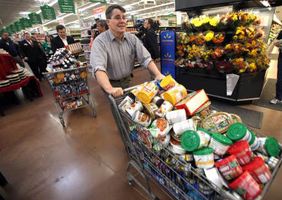
Foodie or regular shopper. Shopping solo, with a wing man or you have the whole bloody family with you. Let’s face it by the time you have selected your items, run the gauntlet of the perishable departments and pole vaulted over 2 dozen product displays strategically located in those narrow store aisles you the shopper are ready to get the heck out of the store. Now there is the rub. As you swiftly move across the front of your local supermarket pushing your loaded shopping basket with bad wheels frantically looking for the friendly face of a cashier to take the burden of checking out and bagging your purchases off of you suddenly you realize that there are no friendly faces available. Your choice is to wait in a long line behind other shoppers who have populated the 2 or 3 checkout lanes that are actually staffed at that particular moment in time or check your grocery purchases out yourself. Please note that there are now hybrid alternatives to the self-checkout of your groceries including a scan as you go device however in this post we will stick to the either or choice dilemma for ringing up your groceries.
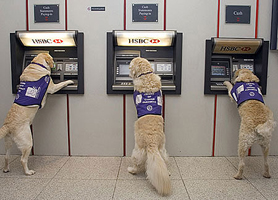
Some pundits might at this point begin to draw comparisons between the similarities of the history of retail banking ATM’s and self-checkout registers in the supermarket. I will briefly say that yes years ago one had to go into a bank branch to make deposits and make withdrawals. Waiting on-line was the norm however I believe the staffing levels in the banks back then were at a much higher level than let’s say a funeral home information booth at a run for life marathon. ATM’s at first allowed the consumer to have access to the cash in their respective accounts 24 hours a day 7 days a week. Yes this was a win for the consumer. No real heavy lifting here so to speak and no extra charges or fees. As time went by did the banks profit by reducing their branch staffing levels? Yes. Later as the consumers need for cash lessened even the ATM’s began to lose some of its luster in the eyes of the banking consumer. The two situations are different as I will now explain within the balance of this post.
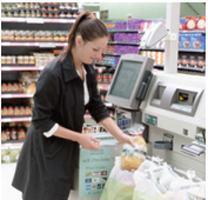
The basic point to be made in defense of the title of this post is that any customer in any supermarket that scans, bags and pays for their supermarket product purchases is saving that supermarket money by reducing the stores labor expenses. Yes a weak case can be made that with the initial capitalized costs of these self-checkout registers, $25 to $60 thousand each, along with their annual operating costs, there is no savings to the store. Again some might suggest that these upfront cost are more expensive than what it would take to staff a regular register with an employee and that the reason that stores deploy self-checkouts is really because of customer service demands. Well let me set everyone straight on the manned register versus self-checkout register expense point. It is my professional opinion, based on years of experience, that the majority of self-checkout register systems in use in today’s supermarket are less expensive to operate than a register manned by an employee. There is no other reason why the industry has embraced these machines except for the fact that it reduces their labor expenses.
Okay point number two. It is a fallacy to believe that supermarket chains, operators and business owners implement self-checkout registers because of the need to provide customer service. Let’s stop for a moment and revisit that last sentence. Now that we have taken a moment to digest this broad claim of mine let’s take a closer look at it.
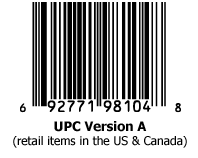
Once again if we all get into the proverbial time machine and go back to late 1970’s or early 1980’s we would see that most supermarkets and grocery stores did not have cash registers that scanned the bar codes or the UPC codes on products. Yes at that point in time a number of national and local chains had begun rolling out scanning cash register systems in their stores because the use of this technology would certainly reduce the time it took to ring up a customers order which in turn was a good thing for customer service. No one disagreed with this line of thought. One of the downsides in implementing bar code scanning in a supermarket was the upfront capital costs. Outside of the necessary electrical and communications wiring requirements, along with in most cases the checkout stands themselves which had to be replaced as well, a POS or Point of Sale cash register system could run as much as $10,000 per lane not counting the cost of back office support systems, hardware maintenance and weekly information updates. There were additional benefits to the retailer as well what with availability of sales and profitability reports by product and/or department. Detailed sales analysis in the supermarket at store level had finally arrived. Better and more efficient inventory levels were sure to follow, at least some thought so anyway.
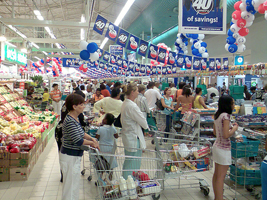
Okay so POS scanning systems slowly made their way into most main stream supermarket throughout the 1980’s and early 1990’s. Some more progressive thinking small independent supermarket operators also adopted this product scanning technology early on when the larger chains were implementing it but by the early 1990’s pretty much all supermarkets had either or where in the process of installing these new “computer” type cash register systems in their stores. They market was forcing all retailers to do this because the customer perceived this type of cash register system as a way to check out quickly at the end of their shopping trip saving them valuable time. Once again retailers benefited from this new cash register technology as well. The belief was that a cashier manning a POS scanning cash register could check out more customers per hour than a cashier who rang up each product by price. With less cashiers required to serve the customer at the front of the store than the labor savings achieved there meant more money/profit going to the bottom line. Of course there were many other benefits for a retailer implementing this technology but that discussion could fill a couple of posts on this blog and is not germane to this particular one.
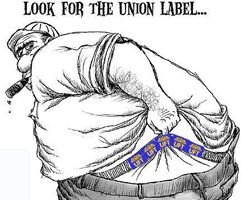
A small side note here back when bar code scanning systems were being implemented in the U.S. supermarket industry labor unions were up in arms about industry management using this new technology. The loss of union jobs was obviously a major reason for their position on challenging the use of these systems for it would lead to lower staffing levels in the store therefore less jobs for their members. Later when self-checkout cash registers began to be implemented in supermarkets there was even less hyperbole emanating from the unions concerning the loss of union jobs because of the reduction in their overall influence in the labor market.
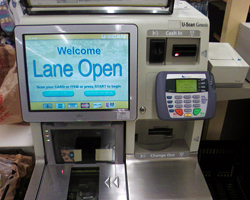
Okay so we can that in bringing bar code scanning cash registers into the supermarket the retail industry had served up improved customer service to their shoppers and at the same time achieved labor savings along with now having access to more detailed inventory/sales reports. To me this sounded like a win-win situation for everyone except organized labor. So now let’s take a closer look at the implementation of self-checkout cash register systems in the U.S. supermarket industry.
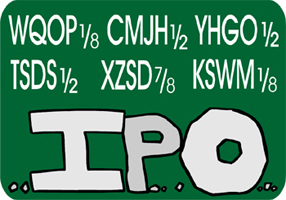
Even with the reduction in the presence and strength of organized labor in the U.S. supermarket industry labor costs were one of the three perceived menaces of profitability in the supermarket industry. The others, in no particular order, were the costs of goods or the how much the retailer paid for the products that they sold to their customers. The last threat was the cost of utilities services in a store. As some of you might remember from an earlier posts I believe it was a study by the University of Iowa that stated that 5% of the total consumption of electricity in the U.S. is by supermarkets. At the same time as the implementation of self-checkout cash registers the U.S. supermarket industry was going through a period of consolidation. Larger U.S. national chains were buying up regional supermarket chains. Foreign supermarket chains were buying up U.S. regional chains. Investors were demanding an even higher return on their investments as the technology industry boomed. From a historical standpoint most successful supermarkets of the day averaged a 1.7% net profit margin while the really successful ones averaged 2% or slightly higher of a net profit.
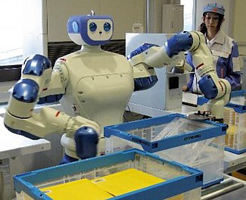
Retail technology vendors began to tease the CEO’s and CFO’s of the supermarket industry by peddling a potential cure for the increasing costs of labor in their checkout operations. This magic pill was the self-checkout cash register system. Just imagine company executives having an employee that never calls in sick, never requires health insurance, works without a break and never asks for a raise they chortled. Remember also that there is no possible way that these mechanical workers will ever ask to join a labor union. Of course these technology vendors had to convince these executives to swallow a tremendously high level of capital expenditures to achieve this labor cost nirvana but they also had a backup plan to get them on board. This plan was to pitch these new mechanical workers as a form of customer service! Yes these devices would be something that customers would be demanding, especially as these retail executives continued to trim the number of workers at the front of their respective operations, so everyone shouted with glee as they drank the Kool Aid.
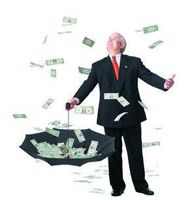
Obviously I have a certain predisposition to the issue of whether the retail food industry implemented self-checkout cash register systems for labor savings benefits or for customer service reasons – these two reasons are mutually exclusive. As the line in one particular movie went, sorry Kevin Coupe and Mike Sansolo for using the movies for business lesson, “do not piss on my back and tell me that it is raining”.

As a consumer just think of it. You are now ringing up the products that you are purchasing from the store. After ringing them up you are then putting these products in some type of bag that if applicable you will put back in your shopping cart and then take to your vehicle. The first two tasks that were normally done by the supermarket cashier is now being done by the shopper therefore saving the retailer labor costs. If there was a real human ringing up your purchases then there might possibly be an exchange of pleasantries between the two parties along with the potential of a retailer-customer relationship bond being formed. In some cases this bond could contribute to the customer loyalty factor that retailers crave but we will leave this subject on the side of the road for now.
So the point that I am making in the title of this particular post rings true. If I the customer am now doing the work that some employee in a store use to do then why am I not being compensated for my free labor in the form of a discount on my order or a credit on my next one. It is insulting from a customer service standpoint and it is just another example of how businesses today squander marketing and increased sales opportunities by implementing poorly thought out strategies. It is also indicative as to how supermarket retailers view their customers as a whole. Is it a pain to go into a store and do one’s shopping only to find out that there are only a few manned cash registers in which to checkout at? Of course it is. However to be herded over to the self-checkout registers, like lemmings to the sea, is just plain insulting. Worse yet is being told by the retailer that the only reason that they have these type of checkout systems is because that is what we the consumer clamored for. That is simply a lie.
TBC in another Post
AB
Copyright @ 2010 Supermarket Stories
Paper or Plastic and the Environment But it is Still About Me

The debate over plastic bags along with local and state governments wanting to remove the option from our shopping trips leaves a lot for one to think about. As a matter of full disclosure I obviously favor paper bags as my choice for carrying my grocery purchases home from the store. I especially like the heavy duty ones with handles.
I do recognize that meat and poultry products leaking through my paper bag would be messy if not dangerous so there is still a need for smaller plastic bags to take care of these situations. My awareness level for food contamination and food borne bacteria has increased over the last five years thanks to the media and the stories about the chance for an animal urinating on the produce products in the fields that I might buy. No leaking trays of chicken juice or bloody packages of ground beef do not even make the sensational headlines on the Fox Noise Channel but it is just gross to look at these things in my shopping cart and think about the possible consequences that they may bring.
A friend of mine would call me anal in my grocery shopping habits for I make my trip through the store with the precision of a military pilot with a GPS unit. First the produce department is shopped with each “fresh” item dutifully entombed in its own small plastic bag. Although some stores need to watch what type of plastic bags they use for these purposes because I have used some that just will not open up after being yanked from the roll. I know that some people have seen me struggle with the bags and then just mumble under my breath that these types of bags are evil. In all fairness they are usually the cheapest ones for a store to buy just ask Uzzi.
After my journey through the produce department I make my way to the dairy department scrutinizing the sell by dates. What I have noticed in my grocery store is that the sell by dates seem to be closer and closer to the current date than ever before. I first noticed this a year ago when this particular supermarket chain had announced a new round of cost cutting moves to boost profitability. Were these two issues related? I do not know the answer but is all I know is that they left my plastic produce bags alone and I can still easily open them at will.
Anyway after a quick trip up a couple of traditional grocery aisles I arrive in the meat department and there I begin to be ecological unsound once again. Every tray or package of “fresh” meat or poultry that goes into my cart is encased like pieces of asbestos having been just removed from the basement of your grandmothers old house. Some packages of meat, like roasts, can not be accommodated by just one of those tear off bags nope sometimes it takes two or three of them to complete the mummification process. On some shopping trips I can not even find one package that is not oozing juice or blood like something out of a True Blood show. I think that I am going to recommend that supermarkets install sink and shower facilities for the customers to use after selecting their meat department purchases.
These department plastic bags can cost between 1/2 and 1 cent for the retailer to buy while the plastic bags for use at the registers can cost 1 cent and more depending on store logo and community message requirements. Paper bags are a couple of cents while the really good ones with the handles costs even more. Of course there are levels of quality and strength within the plastic and paper bag lines but as far as Uzzi is concerned the cheaper the better. As long as the customer get’s out the door with their purchases then it is their problem as he would say. In the mean time he feels that he has to keep the costs down because he is taking his wife and kids to Europe soon and they need the traveling money.
I remember the time that one of the product distributors that calls on the Uzzi Family business mentioned that they had some reusable shopping bags that a CPG, look that term up or follow the hyperlink, company was using to promote a particular line of dinner entres and the Uzzi company could have a couple of boxes of them to give out to their customers. Give out Uzzi must have thought, yea right. Well as Uzzi usually does he got the distributor to provide even more boxes of these FREE reusable shopping bags to Uzzi Family company. I thought to myself wow Uzzi is really a dedicated ecologist or at least more green than I thought he would be capable of being. Of course Alex you were wrong, just dead wrong.
Here was Uzzi’s plan, get as many of the FREE reusable shopping bags as possible and then turnaround and sell them to the Uzzi Supermarket chain customers for what he feels is a discounted price – maybe a buck. Like magic the boxes of FREE reusable shopping bags flowed into the stores and then were put on racks for the customers to buy. When Uzzi ran out of these FREE bags to sell he somehow got more. This went on for a while and I guess that is why some people say that there is money in the green movement it is just that I did not realize that this was one of the ways to do it.
As to reusable shopping bags well I just do not know where I stand on them. These bags do tend to get dirty much less worn after a few months of usage. Depending on the material that they are made out of they get bit funky. Now some customers bring in their reusable shopping bags that are adorned with logos and other chic graphics.
To begin with there are reusable shopping bags like the ones from the local Public Radio fund drive, the charity walk, the Green organizations but then there are the ones from ones personal vacations and upscale retailers. Yes narcissism is alive and well even in the world of reusable shopping bags. Let’s see you have the ones who’s writing on the bags say I have been to the Bahamas or Amsterdam and how about the ones that say Coach or Chanel. How did reusable shopping bags become just another opportunity for someone to be a Label Whore and say that this bag is all about me? Narcissism at it’s best even in the world of ecology.
Sorry I was on another tangent so it is time to return to the main theme of this post. Can you imagine what kind of bacteria and germs are on those reusable shopping bags after a couple of trips to the supermarket? What happens if you do not wrap your meat purchases in plastic bags before putting them into your reusable bag? If you do not put your produce purchases in plastic bags first than to me it means that before you get those peppers or onions home they would have had a chance to leech the dog urine that was applied to your produce products before they were picked at the farm on to the bag itself. That’s right and that Baguette in the thin paper sleeve that you put in that reusable bag gets that same animal urine from the produce products on the bread as well. Yea go ahead and use those reusable bags now – not me.
You can see why I might have issues with reusable bags and now when I am in a grocery store I take a closer look at what type of bags that they are trying to sell to their customers. Some retailers today have ones with that cardboard bottom however the sides are recycled paper and not that strong. Then they put this yarn type string in for handles and want to charge a dollar for those bags along with the stores logo. Some have the true recycled weave style bags with the international symbol for recycling on them. The thing with those type of bags is that what the hell were they recycled from? The ones that I have touched felt like they were made from 6 pack soda rings and old sneakers.
Now back to my shopping trip I usually finish up in the Frozen Food section for some Ice Cream and then it is down the main aisle to the checkout. Where I live now there is no more paper or plastic bags it is just plastic. Whether you get checked out by a cashier or use the infamous Self Checkout Registers – for the life of me I still can not get use to a retailer wanting me to ring up and bag my own purchase but more on that in another post, you get plastic. At my regular store the thickness of the bag has gotten thinner and thinner over the last few years. If you put more that 8 or 9 items in the bag or if you accidentally bump the side of the bag with a straight edge or something then it splits open.
I know that Uzzi is a possessed item in the bag counter type of person. Whenever he is in a store, either his families or a competitors, with laser like focus Uzzi looks and sees how many items a cashier is putting into a plastic bag. Fill it to the max is his philosophy. Oh and no double bagging for Uzzi’s customers so do not even think about asking for them because the family is planning on buying new company cars for themselves and Mercedes, BMW, Infinity and Lexus will not take plastic bags on a trade in. Thank God someone is helping the automobile industry in these trying economic times.
One day a while back I saw Uzzi run after some little old lady that had just left the store because she grabbed a couple, yes a couple of plastic bags from an unmanned checkout stand. He moved out the automatic door like a lion on the hunt and pounced on the elderly lady before she could walk out of the loading zone. While I could not hear the words that were exchanged the facial antics of Uzzi and the utter look of bewilderment on the face of the little old lady was one of those images that I will never forget. As Uzzi returned to the store I watched the lady that procured those couple of extra bags take one out and put her gallon of milk in, I guess to give it extra support for her walk home and the second one she fashioned as an impromptu plastic hat since it was raining very hard that day. I later asked the store manager if he knew that customer who had picked up the two extra plastic bags and he said oh yes she is in here 4 or 5 times a week and buys groceries for herself and a couple of others at the retirement home a mile up the street. He asked me why I wanted to know that and I said never mind. Uzzi really knew how to take customer relations to a new lower level.
Paper or Plastic the choices are less today than they were even a few years ago. Again I want to consider myself ecologically aware but not driven. When cities in California instituted their plastic bag ban the warning shot was sounded but I heard salvation. When the local government in Washington D.C. did the same thing my spirits were raised. I know that at some point in my community I will get my paper bags back and plastic bags will be banned from the supermarket. I am counting the days.
Well I have to dash now and stop to pick up my dry cleaning which will come encased in three very large plastic bags – thank goodness for the Green Movement.
AB
Copyright @ 2010 Supermarket Stories

Recent Posts
Categories
Archives
- November 2010 (2)
- October 2010 (10)
Calendar of Posts
| S | M | T | W | T | F | S |
|---|---|---|---|---|---|---|
| 1 | ||||||
| 2 | 3 | 4 | 5 | 6 | 7 | 8 |
| 9 | 10 | 11 | 12 | 13 | 14 | 15 |
| 16 | 17 | 18 | 19 | 20 | 21 | 22 |
| 23 | 24 | 25 | 26 | 27 | 28 | 29 |
| 30 | ||||||